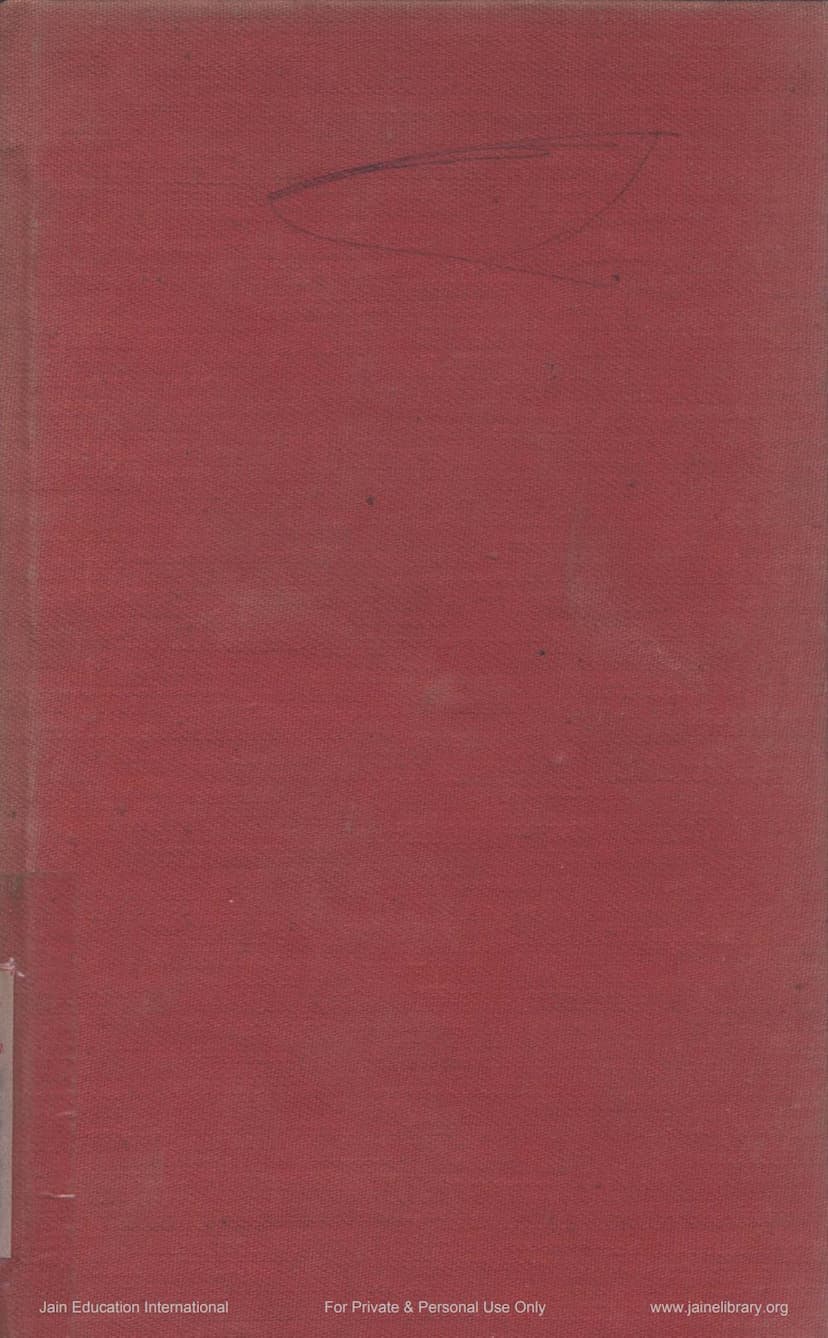Jainas In History Of Indian Literature
Added to library: September 2, 2025

Summary
Here's a comprehensive summary of the provided Jain text, "The Jainas in the History of Indian Literature" by Dr. Maurice Winternitz, edited by Jina Vijaya Muni:
This work is a detailed exploration of the significant contributions made by the Jainas to the vast tapestry of Indian literature. The book aims to provide a concise yet authoritative overview of this often-underestimated literary tradition, correcting the limited attention Jainas have received in earlier Western scholarship on Indian literature.
Key Contributions and Themes:
-
Challenging Previous Scholarship: The author begins by highlighting the scant and often dismissive treatment of Jaina literature by earlier scholars like Weber, von Schroeder, and Macdonell, who either omitted significant contributions or erroneously stated that Jainas lacked a literature "worthy of the name." Winternitz explicitly states his thesis: that Jainas have contributed substantially to religious, ethical, poetic, and scientific literature in ancient India.
-
Ascetic Literature and Shared Traditions: A core argument is the existence of a distinct "Samana" (ascetic) literature that predates or runs parallel to specifically Buddhist and Jaina canons. This literature is characterized by its disregard for caste and ashrama systems, its focus on popular tales, fables, and parables rather than Brahmanic myths, and its emphasis on compassion and Ahimsa. Winternitz demonstrates the close connection between this ascetic literature and post-Vedic literature, showing how many stories, dialogues, and verses found in the Mahabharata and Puranas also appear in Pali Gathas and Jaina/Buddhist canonical texts. This suggests a shared literary heritage from which all these traditions drew.
-
Rich Narrative Literature: Jainas are presented as prolific storytellers and preservers of Indian folk tales. Their literature, both canonical and non-canonical, is a treasure trove of popular stories, fairy tales, and narrative poetry.
- Canonical and Commentarial Works: Stories are found within the Angas and, more importantly, in the extensive commentaries (Niryuktis, Bhasyas, Carnis) by scholars like Haribhadra, Sīlāńka, Śāntisūri, and Devendra.
- Kathānakas: Popular tales intended for religious edification are highlighted, such as the Kālakācāryakathānaka, Uttamocaritrakathānaka, and others.
- Kathās (Novels): Original Jaina novels like Haribhadra's Samarāiccakahā, Dhanaṁāla's Bhavisattakahā, and Siddharși's Upamitibhavaprapañcākathā are discussed, along with imitations of classical Sanskrit novels.
- Jaina Epics and Purāņas: The book mentions the Prākrit epic Paumacariyam by Vimala Sūri (the Jaina Rāmāyaṇa) and Raviṣeṇa's Sanskrit Padma-purāṇa, as well as Jinasena's Harivamśa Purāṇa.
- Biographies of "Excellent Men": The "Purāņas" (Digambara) and "Caritas" (Śvetāmbara) recounting the lives of the 63 great men (Uttamapurisa) are noted as significant substitutes for Brahmanical Epics and Purāņas. Hemacandra's Triṣaṣṭiśalākāpuruṣacarita and its appendix, the Parisista Parvan (Sthavirāvali Carita), are particularly emphasized for their vast collection of tales.
- Prabandhas: Works like Merutuṅga's Prabandhacintāmaņi and Rājasekhara's Prabandhakośa are noted for their anecdotes about historical figures, offering insights into the literary life of royal courts.
-
Kāvyas and Mahākāvyas: Jaina poets also composed elaborate epic poems (Mahākāvyas), often on religious themes. Examples include Harichandra's Dharmasarmābhyudaya, Vagbhata's Neminirvāṇa, and Jinasena's Pārśvābhyudaya (which incorporates Kālidāsa's Meghadūta). Hemacandra's Dvyāśryakāvya Kumārapālacarita is highlighted for its dual Sanskrit and Prakrit composition and its function as an illustration of his grammatical works.
-
Lyrical and Didactic Poetry: Jainas produced numerous hymns (Stotras) in both Prakrit and Sanskrit, often in elaborate styles. Didactic poetry, found extensively in the canon, also includes non-canonical works like Dharmadāsa's Uvāsaṁmālā and Amitagati's Subhāṣitaratnasamdoha and Dharmaparīkṣā, which offer moral guidance and stories. Hemacandra's Yogaśāstra is discussed as a significant didactic work. Anthologies of moral maxims are also noted.
-
Scientific and Technical Literature: Jainas made valuable contributions to various scientific fields:
- Astronomy and Geography: Works like the Sūriyapannatti are mentioned as important for understanding pre-Greek Indian astronomy.
- Rhetoric (Alamkāraśāstra): Authors like Vāgbhața and Hemacandra wrote important treatises on poetics.
- Grammar: The Jainendravyākaraṇa (attributed to Jinendra, authored by Pujyapāda Devanandin) and Śākaṭāyana's grammar (improved by Hemacandra into the Siddhahemacandra) are presented as crucial works in Sanskrit and Prakrit grammar. Hemacandra's Prakrit grammar section within Siddhahemacandra is deemed the most important available resource for understanding Prakrit dialects.
- Lexicography: Jaina scholars like Dhanaṁpāla and Hemacandra compiled significant Prakrit lexicons.
-
Philosophical Works: Jainas developed an original philosophical system, Syādvāda, which holds a distinct position between Brahmanic and Buddhist thought. The book mentions works on logic (Nyāya) and metaphysics, noting the Jaina engagement with and contributions to these fields, sometimes even preserving Buddhist logical texts. Key figures include Siddhasena Divākara, Samantabhadra, Akalaṁka, Prabhācandra, and Deva Sūri. Haribhadra's unbiased accounts of various philosophical systems (Saddarśanasamuccaya) are praised for their impartiality.
-
Treatment of All Branches of Science: Beyond literature and philosophy, Jainas engaged with a broad spectrum of knowledge, including Arthaśāstra (political science), Kāmaśāstra, mathematics, and medicine. While their engagement with Arthaśāstra is notable, the work clarifies that the Kauṭilīya-Arthaśāstra's connection to Jainism is tenuous. However, Jaina works like Somadeva Sūri's Nīti Vākyāmṛta and Hemacandra's Laghv-arhannītiśāstra are significant contributions to political and ethical thought, often drawing from Brahmanical traditions but infusing them with Jaina ethics.
-
Influence on Dravidian Languages: The work reiterates the point made by R. W. Frazer about the significant role of Jainas in promoting and enriching Dravidian literatures in South India, forming the foundation for Canarese, Tamil, and Telugu literary languages.
In essence, Dr. Winternitz's work meticulously details the Jainas' pervasive influence across virtually every literary and intellectual domain in ancient and medieval India, emphasizing their unique philosophical contributions, their narrative richness, their grammatical scholarship, and their integral role in shaping the broader landscape of Indian literature and culture. The editor, Jina Vijaya Muni, highlights the importance of this essay as a precursor to Winternitz's larger work and expresses pride in bringing this vital perspective to a wider audience.